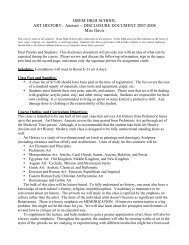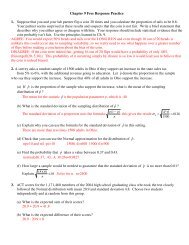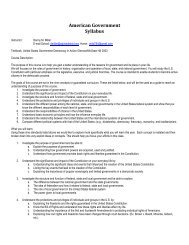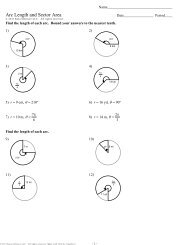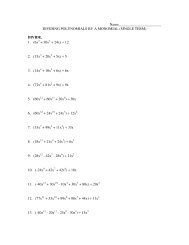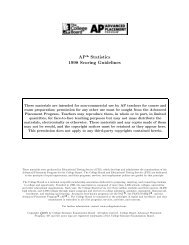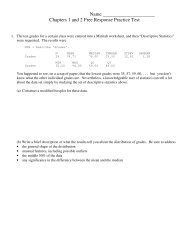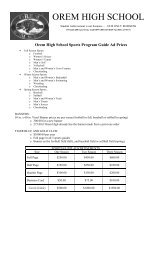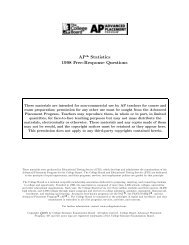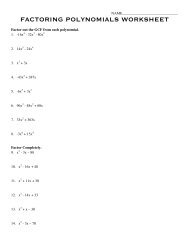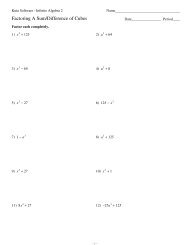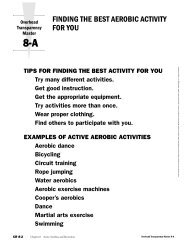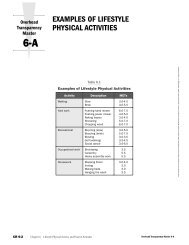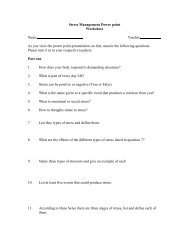You also want an ePaper? Increase the reach of your titles
YUMPU automatically turns print PDFs into web optimized ePapers that Google loves.
OverheadTransparencyMaster17-APHYSICAL CHANGES CAUSEDBY STRESS• Eyes take in more light.• Heart rate increases,heart pumps more blood,and blood pressure rises.• Digestive systemslows down, stomachacid increases.• Urine productiondecreases.• More sugar is released intobloodstream.• Blood vessels carry moreblood to brain and musclesand less to skin and digestive system.• Sweating increases.• Muscles tense.• Body cells increase their release of energy.• Blood’s clotting ability increases.From Fitness for Life Teacher Resources and Materials, Fifth Edition by Karen McConnell, Charles B. Corbin, and Darren Dale, 2005, Champaign, IL: Human Kinetics.CR 17-2 Chapter 17 <strong>Stress</strong> <strong>Management</strong>Overhead Transparency Master 17-A
From Fitness for Life Teacher Resources and Materials, Fifth Edition by Karen McConnell, Charles B. Corbin, and Darren Dale, 2005, Champaign, IL: Human Kinetics.OverheadTransparencyMaster17-BEFFECTIVE WAYSTO MANAGE STRESS• Rest in a quiet place.• Reduce breathing rate.• Reduce mental activity.• Reduce muscle tension.• Use exercise as a diversion.• Identify the causes of the stress.• Tackle one thing at a time.• Take action.• Manage time effectively.• Accept what cannot be changed.• Think positively.• Do not mask your problems.• Try not to let little things botheryou.• Be willing to make adjustments.• Keep your body in good health andphysically fit.Overhead Transparency Master 17-BChapter 17 <strong>Stress</strong> <strong>Management</strong>CR 17-3
Name Class DateApplication17MY STRESS DIARYUse this sheet to keep track of your everyday stress over a 3-day period.Write down the event that caused the stress (the stressor), the emotion thataccompanied the stressor, and the physical symptoms that you experienced. Atthe end of the 3 days answer the questions below.<strong>Stress</strong>or Emotion(s) Physical symptom(s)Example: Biology test Nervousness StomachacheExample: Fight with mom Anger, frustration Hyper energy, headacheDay 1__________________________________________________________________________________________________________________________________________________________________________________________________________________________________________________________________________________________________________________________________________________________________________________________________________________________________________________________________Day 2__________________________________________________________________________________________________________________________________________________________________________________________________________________________________________________________________________________________________________________________________________________________________________________________________________________________________________________________________Day 3__________________________________________________________________________________________________________________________________________________________________________________________________________________________________________________________________________________________________________________________________________________________________________________________________________________________________________________________________1. What patterns do you notice about your stressors during the 3 days? ________________________________2. What things surprised you about the emotions and physical symptoms you experienced as a result of yourstressors? ______________________________________________________________________________3. Select one stressor from each day and identify one way you could avoid that stressor in the future, or one wayyou could handle your emotional reaction to the stressor better.Day 1: ____________________________________________________________________________________________________________________________________________________________________Day 2: ____________________________________________________________________________________________________________________________________________________________________Day 3: ____________________________________________________________________________________________________________________________________________________________________From Fitness for Life Teacher Resources and Materials, Fifth Edition by Karen McConnell, Charles B. Corbin, and Darren Dale, 2005, Champaign, IL: Human Kinetics.CR 17-4Chapter 17 <strong>Stress</strong> <strong>Management</strong>Application 17 Worksheet
Name Class Date17ReinforcementSTRESS-RELATED WORD SCRAMBLEComplete the sentences below by unscrambling the underlined words.Write the letters of the word in the blanks below each sentence. Use thenumbered letters to decode the message at the bottom of the page.From Fitness for Life Teacher Resources and Materials, Fifth Edition by Karen McConnell, Charles B. Corbin, and Darren Dale, 2005, Champaign, IL: Human Kinetics.1. Anger and fear are powerful TAIMONEOL OSRSETSRS.___ ___ ___ ___ ___ ___ ___ ___ ___ ___ ___ ___ ___ ___ ___ ___ ___ ___1 2 32. The body’s reaction to a demanding situation is ERTSSS.___ ___ ___ ___ ___ ___43. Having an argument with a friend is an example of a LAISOC RESORTSS.___ ___ ___ ___ ___ ___ ___ ___ ___ ___ ___ ___ ___ ___5 6 74. Air and noise pollution are both CYSPIHLA RSTESSROS.___ ___ ___ ___ ___ ___ ___ ___ ___ ___ ___ ___ ___ ___ ___ ___ ___8 9 10 115. Your body’s preparation for bursts of energy in response to danger is a SRETSS NOPSERES.___ ___ ___ ___ ___ ___ ___ ___ ___ ___ ___ ___ ___ ___12 136. Anything that contributes to stress is a ROSERSTS.___ ___ ___ ___ ___ ___ ___ ___14 15 167. <strong>Stress</strong> affects you more if you are GUIFADET than if you are well rested.___ ___ ___ ___ ___ ___ ___ ___17 188. REDISSTS is caused by unpleasant situations.___ ___ ___ ___ ___ ___ ___ ___19 209. <strong>Stress</strong> that accompanies successful or joyful situations is SUESRETS.___ ___ ___ ___ ___ ___ ___ ___21 22 23___ ___ ___ ___ ___ ___ ___ ___ ___ ___ ___ ___ ___ ___ ___23 12 3 20 7 19 10 18 13 1 17 17 4 5 14___ ___ ___ ___ ___ ___ ___ ___ ___ ___.9 16 21 11 8 15 6 2 22 8Reinforcement 17 WorksheetChapter 17 <strong>Stress</strong> <strong>Management</strong>CR 17-5
Name Class Date17Chapter TestMANAGING STRESSChoose the letter of the best answer for questions 1-14.Use what you learned throughout the chapter to answer the final question.1. <strong>Stress</strong> isa. the mind’s reaction to a normal situation.b. a set of physical changes that occur over alifetime.c. an automatic reaction to a demandingsituation.d. a relationship with another person.2. Which situation would cause eustress?a. failing a testb. meeting someone you really likec. having an argument with a parentd. breaking a bone in your arm3. <strong>Stress</strong> caused by an unpleasant situation isa. eustress. c. social stress.b. emotional stress. d. distress.4. Worry, anger, grief, and depression area. physical stressors. c. eustress.b. social stressors. d. emotional stressors.5. Which of the following does NOT contribute tocompetitive stress?a. completing practice and preparationb. performing in front of a crowdc. being evaluated by othersd. feeling the outcome is important6. Hunger and thirst are example ofa. emotional stressors. c. physical stressors.b. competitive stress. d. social stressors.7. Distress in daily life isa. desirable. c. rare.b. unavoidable. d. avoidable.8. Which is an immediate reaction to stress?a. decreased adrenaline in the bloodb. dilated pupilsc. weakening of the immune systemd. ulcers9. Reactions to a stressora. vary from person to person.b. make you very alert.c. are always physical.d. are rarely mental.10. Which is one effective way to immediately reducestress?a. Hope the problem goes away.b. Go over the problem in your mind.c. Take several long, slow breaths.d. Ignore the cause of the stress.11. When should you avoid a stressful situation?a. when the situation is not importantb. when you are youngc. at all timesd. when it involves other people12. A person who would be LEAST likely to havestress-related illness would be someone whoa. gets angry at small incidents.b. postpones stressful decisions.c. often thinks about past mistakes.d. tries to solve problems one at a time.13. Which of the following is a good way for astudent to manage stress caused by an upcomingimportant semester exam?a. Accept that he or she will probably not do well.b. Form a study group and write practice tests.c. Try not to think about it at all.d. Blame the teacher for making the class difficult.14. Which of the following statements about stress isTRUE?a. You should always avoid competitive stress.b. <strong>Stress</strong> can be managed with vitaminsupplements.c. A situation that causes eustress for one personcan be distressful for another.d. <strong>Stress</strong> and fitness have little to do with eachother.15. How can you manage stress in your daily lifeactivities?____________________________________________________________________________________________________________________________________________________________________________________________________________________________________From Fitness for Life Teacher Resources and Materials, Fifth Edition by Karen McConnell, Charles B. Corbin, and Darren Dale, 2005, Champaign, IL: Human Kinetics.CR 17-6Chapter 17 <strong>Stress</strong> <strong>Management</strong>Chapter 17 Test



